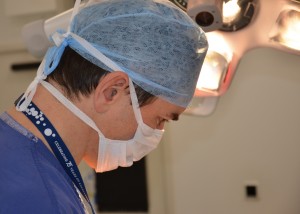What happens at a skin cancer screening clinic?
 At Dr Bowling’s skin cancer screening clinic we offer a friendly, professional approach to the monitoring, diagnosis and treatment of moles and all forms of skin cancer.
At Dr Bowling’s skin cancer screening clinic we offer a friendly, professional approach to the monitoring, diagnosis and treatment of moles and all forms of skin cancer.
The clinic is there for you if you have particular worries, but it should also be part of your proactive approach to looking after your health. In the same way that you have your teeth checked by the dentist or your eyes tested by the optician, you may benefit from having your skin checked by a qualified dermatologist.
Protecting your dignity
Naturally, having your bare skin examined by a stranger can be quite embarrassing, whatever your age or disposition. At the clinic, we completely understand that you may feel this way and so our team are fully trained to protect your dignity and privacy at all times, including the use of chaperones where appropriate.
Skin cancer screening
Regular skin cancer screening helps to keep track of your moles and check for any changes or abnormalities that might be a warning sign of malignant melanoma. Dermoscopy will be used to assess the shape, size and colour of your moles in detail. Sometimes a digital dermoscopic image of the mole might be taken which can be used to form a baseline for future comparisons.
Skin cancer screening gives you the opportunity to discuss any issues you may have, such as risk factors, itching or bleeding around your moles or any other skin problem. Dr Bowling’s consultations have a fixed charged, and you are not by the number of moles examined, a common practice in some clinics that he considers unethical.
Understanding your concerns
Whatever age you are, we appreciate that a potential diagnosis of cancer is a scary concept. We do all we can to help you overcome your anxiety about your moles and their potential to cause you problems. The aim of our screening clinic is to put your mind at rest, whether that is through the reassurance that your skin is healthy, or through prompt, effective treatment if problems do occur.
Mole removal – shave biopsy
In general, most moles are not in danger of becoming cancerous, but they can still be a real nuisance. Moles can catch on clothing and become irritated, or they can rub during activities such as sports or walking. Dr Bowling can shave these problem moles down to skin level to stop this irritation. Mole shaving takes just a few minutes, under a local anaesthetic. Shaved moles do not usually require stitches, although they will need dressing until they start to heal.
Mole removal – excision biopsy
If dermoscopy results indicate a mole that is abnormal, Dr Bowling will look into this in more detail and you may need an excision biopsy of the mole. This can rule out cancer as well as diagnose cancer.

_____________________________________________
“Our friendly team will always explain the procedure in full, so that you understand what is happening and know what to expect.”
____________________________
Dr Jonathan Bowling is an experienced skin cancer surgeon.
